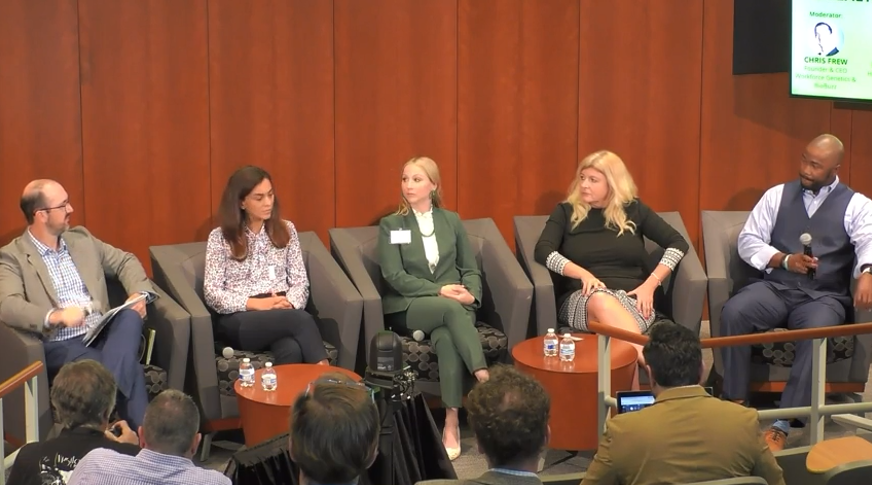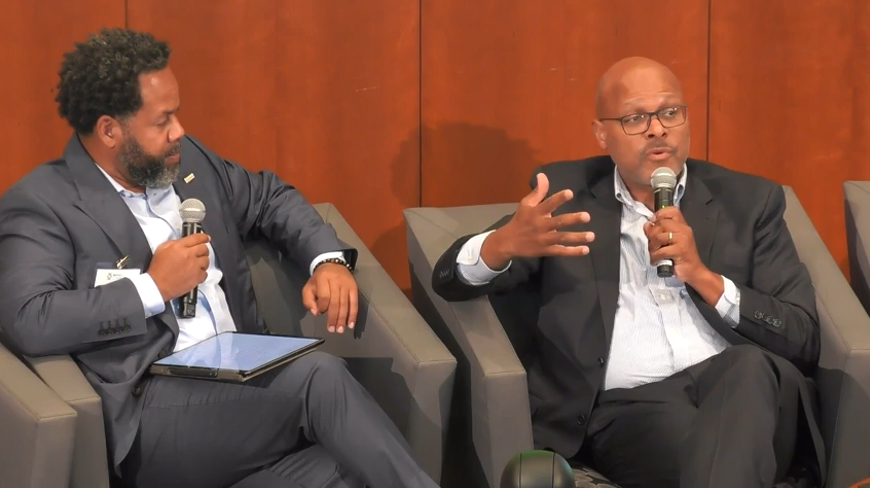
How Do We Bolster the BioHealth Capital Region Workforce?
October 3, 2022
The BioHealth Capital Region has made a name for itself in the last few years, currently holding tight to its #4 ranking on the Genetic & Engineering News (GEN) Top 10 Biopharma Clusters list. As more life science companies flock to the region, though, a new challenge arises – how do we create a strong pipeline of local talent to support their needs? This pipeline not only includes the high concentration of experienced talent the BHCR is known for but entry-level employees and people without four-year degrees who can be trained on-the-job.
The topic of bolstering the region’s workforce was a central focus of the 8th Annual BioHealth Capital Region Forum in Rockville, Maryland on September 20. One panel, “Cultivating Talent in the Biohealth Capital Region” focused solely on the state of hiring and retention in the market.
Panelist Thomas Watkins, the Director of Talent Acquisition at US Pharmacopeia, said that with 250 biotech companies and 70,000 professionals in a 60-mile radius, he’s not concerned about bringing more talent to the area.
RELATED: How Do We Actually Meet the Needs of the Evolving Life Science Workforce?
“The talent is here, it’s more about identifying what’s here… and creating and cultivating the talent pipeline not just for today but as we move forward,” Watkins said.
Creating that pipeline means working closely with the resources in the region, including colleges and universities. Many local companies are looking for employees who can immediately start working with little to no training. Karen Haslbeck, Head of Human Resources at NexImmune, said that their company has been hiring people from all over the country to fill their needs.

“Right now we need people who can come in, roll up their sleeves and do the job, we need people with experience,” Haslbeck said. “So it has definitely changed the landscape.”
Sadiye Rieder, Associate Director of Research at Horizon Therapeutics, said that when looking for employees it’s important to consider how they will fit in with the company’s core ethos and mission statement. “We have this personal connection to our mission. Our CEO very often openly talks about his and his son’s autoimmune diseases,” said Rieder. “That gives us extra motivation and extra push to get our work done.”
WIth so much talent in the BHCR, now more than ever biotech and life sciences companies must differentiate themselves from the competition to draw jobseekers in. Horizon Therapeutics has done so by focusing on pay equity and diversity; 70% of Horizon’s scientists are women, and women make up 40% of leadership roles.
Watkins noted that transparency on the company’s part is also crucial to job seekers. Hiring managers at every stage of the process must be on the same page about what they offer employees. Building these integral supports into the company not only helps with hiring but with retaining talent, which all the leaders presented cited as a current issue.

“We’ve seen that people are looking for a career, not just a job. They’re really asking ‘how can I contribute across the organization, how am I able to learn and how am I able to contribute to other areas’,” said Stacy Rollinger, Vice President of Human Resources at NextCure. “That’s been a key focus as we identify and retain our talent.”
Identifying talent has long been very traditional in the biotech sphere. Many companies post ads looking to fill roles that require specific degrees or experience. But Maurice Jones, Chief Executive Officer of OneTen, presented a different idea at his keynote, “Opening the Aperture: Strengthening our Ecosystem Through Diverse Talent.”
RELATED: Kite Pharma Invests in Maryland’s Workforce Development Programming
Jones has quite the comprehensive resume: he is a Rhodes Scholar, former deputy chief to governor Mark Warner, and former president and publisher of the Virginian-Pilot. At OneTen, he and other industry leaders are aiming to create 1 million family-sustaining jobs for Black talent in America over the next 10 years.
Jones shared that of jobs in America that pay over $60,000, 80% require applicants to have a four-year degree to be considered, and 71% percent of jobs that pay over $40,000 also require a four-year degree. This is startling when combined with the statistic that 76% of Black talent in the workforce above the age of 25 do not have a four-year degree.
“The notion that I can get an interview for a coding job after having a BA in political science before someone who has done 8 weeks in an intense coding bootcamp is crazy,” Jones said. “But it’s true.”

OneTen, founded in 2020, now works with 75 companies that have committed to opening jobs up to Black talent without four-year degrees. Between the fourth quarter of 2020 and March 2022 alone, OneTen has placed 44,000 Black talent without four-year degrees in family-sustaining jobs. The organization has also partnered with learning institutions that can provide continued education and bootcamps for trainees.
Even if a company does not work with OneTen to find talent, Jones hopes that the organization can help create more accessibility to jobs in general. This includes taking a skills-first approach to hiring rather than a credentials-first approach. When jobs require certain degrees instead of skills or traits, they effectively lock out large parts of the population from consideration. One company that has adopted this mindset is IBM. They went from 80% of their job openings requiring four-year degrees to just 50% without any changes in output or success.
He urged biotech companies to consider making these changes and offering training and bootcamps where they can to provide support.
“This is a cultural shift that won’t happen fast. IBM started seven or eight years ago,” Jones said. “I think companies have to think about what are the internal leadership and resource efforts that they will have to put toward making this kind of change.”






